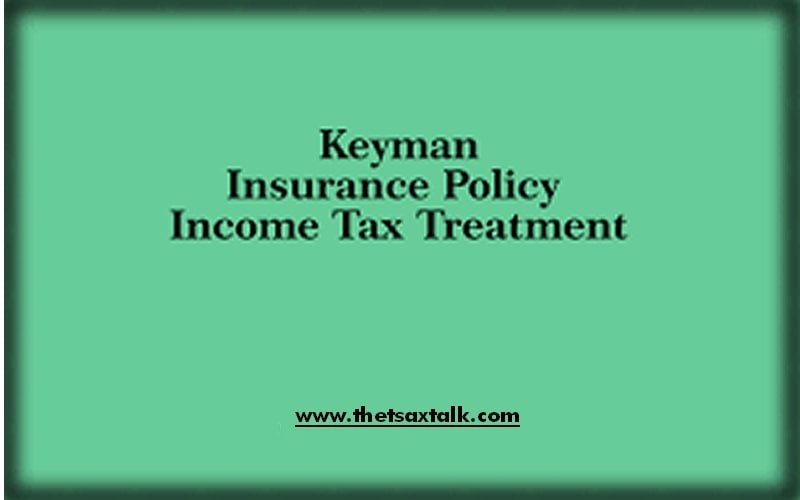![]()
Keyman Insurance Policy Income Tax Treatment
The `keyman’ or ‘key person’ would be any person employed by a company having a special skill set or substantial responsibilities and who contributes significantly to the profits of that organization. Keyman can be the directors of a company having the expertise knowledge in day to day affairs of the company
The objective of Keyman insurance is to cover the life of a Keyman for a monetary value so that in case of untimely death of such Keyman, the loss to the firm is recouped with monetary assistance (insured amount) received from the insurance company.
Basic conditions required to be fulfilled in order to buy a Keyman policy from an insurance company include:
1. The ‘key-man’ should hold less than 51% of the company’s shares.
- The total number of shares of the company held by the Keyman and his family together should be less than 70% of the company’s shares.
The maximum sum assured for Keyman insurance is lower of:
1. Ten times the keyman’s annual compensation package.
2. Three times the average gross profit of the company for the past three years.
3. Five times the average net profit for the past 3 years.
In case the company has keyman insurance, on the death of the employee, the sum assured is paid to the company.Any company buying keyman insurance for its employee can claim a deduction for the premium paid for the policy as a business expense under Section 37(1) of the Income Tax Act. This policy can be used as either an extra superannuation benefit or an ex-gratia payment to the key employee during the service period.
The amount on claim or maturity under a keyman insurance policy is not exempt under Section 10 (10D) of the Income Tax Act if the company is paying the premiums. However, in case the policy has been assigned to the keyman and the keyman is paying the premiums, then the claim/maturity proceeds are exempt under Section 10 (10D). The cost of key man life insurance is not tax deductible; premiums must be paid with after-tax dollars. If the insured employee passes away, the key man policy’s death benefit would be paid to the company free of income tax in most cases.
If the policy, after attaining surrender value, is endorsed to the employee, then the surrender value/maturity value is chargeable to tax under Section 17 of the Income Tax Act. This is because it is treated as `profit in lieu of salary’ in the hands of the employee.
Advantages of keyman Insurance Policy:
- In case of death of a keyman the company is paid money to cope up with the loss.
- In the USA, any business concern buying keyman insurance for its employee can claim a deduction for the premium paid for the policy as a business expense under Section 37(1) of the Income Tax Act. Tax deductions may also apply in other countries.
- This policy can be used as either an extra superannuation benefit or an ex-gratia payment to the key employee during the service period. If the company receives the proceeds on maturity, then they may be taxable. (With recent changes in rules, only Term Plan is available under Key Man Insurance. Hence, there will not be any maturity benefit)
- No need of giving advanced intimation to the income tax authorities.
- The company can also raise loans on the policy from LIC. (On Term Plan, no loan is available)
- For the executives earning high salaries, this policy can be given as a hike in salary and saves income tax.
- It becomes a great help to the business for their tax planning.
- The directors can also safeguard their immediate family from getting affected by the vagaries of the industry and the various business cycles that the business has to encounter.
- Key person insurance policy helps to improve the retention of key human resources of the business.
Disadvantages of Keyman insurance Policy:
- The amount on claim or maturity under a key person insurance policy is not exempt under Section 10 (10D) of the Income Tax Act if the company is paying the premiums unless the policy is assigned to the key person who himself/herself pay the premium.
- If the policy is surrendered then the amount endorsed is taxable in the hands of key man as profit in lieu of salary.


